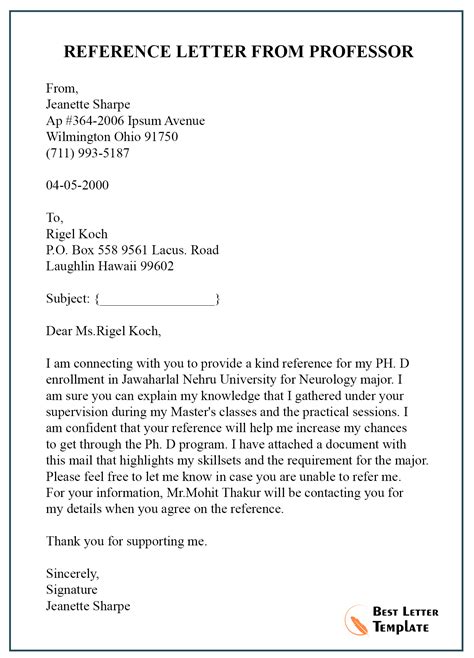Introduction

Seeking a reference letter from a professor is a crucial step in securing employment, pursuing graduate studies, or applying for scholarships. It can be an intimidating task, but with the right preparation and communication, you can increase your chances of receiving a strong letter of recommendation that showcases your skills and achievements.
When to Request a Reference Letter
- Begin reaching out to potential referees at least two months before the deadline for your application.
- Inform your chosen professor about your intentions and provide them with ample time to write a thoughtful letter.
Choosing the Right Professor
- Select a professor who has known you personally and can attest to your academic abilities and character.
- Consider professors from courses where you have excelled or demonstrated your commitment and enthusiasm.
Preparing for the Request
- Update your CV and transcript: Ensure your credentials are up-to-date and ready to be shared with the professor.
- Draft a request email: Outline the purpose of your request, highlight your accomplishments, and express your gratitude for their consideration.
- Meet with the professor in person or via video call: This provides an opportunity to discuss your request more personally and answer any questions they may have.
What to Include in Your Request
- State the purpose of your request (e.g., job application, graduate school admission, scholarship).
- Briefly summarize your qualifications and accomplishments relevant to the position or program you are applying for.
- Mention specific examples or assignments that demonstrate your skills and work ethic.
- Include a copy of your CV and transcript for their reference.
Tips for Communicating with the Professor
- Be respectful and professional in all correspondence.
- Clearly articulate your reasons for choosing them as a reference.
- Provide ample time for them to complete the letter and set a reasonable deadline.
- Offer to provide any additional materials (e.g., writing samples, research papers) that may support their recommendation.
Dos and Don’ts
Do:
- Make a personal connection with the professor and remind them of your involvement in their course.
- Be specific about your request and the qualities you would like them to highlight.
- Follow up politely if necessary, but avoid being pushy.
- Express your gratitude in writing once you receive the letter.
Don’t:
- Expect professors to write letters without having a strong basis for recommending you.
- Request letters at the last minute or with unreasonable deadlines.
- Pressure professors into giving you a positive recommendation.
Additional Considerations
- Confidential letters: Some applications may request confidential letters. In such cases, inform the professor and respect their decision to keep the letter confidential.
- Hard copy vs. electronic letters: If possible, request hard copy letters as they carry more weight. However, electronic letters are acceptable if the recipient organization allows it.
- Proofread the letter: Once you receive the letter, carefully proofread it for any errors. If necessary, request any corrections or revisions from the professor.
Table 1: Sample Timeline for Requesting a Reference Letter
| Step | Timeframe |
|---|---|
| Initial contact | 2 months before deadline |
| Meeting with professor | 1 month before deadline |
| Deadline for letter submission | 2 weeks before deadline |
Table 2: Top Reasons for Professors to Decline Reference Requests
| Reason | Percentage |
|---|---|
| Lack of familiarity with student | 52% |
| Lack of time | 27% |
| Insufficient knowledge of student’s abilities | 16% |
| Student’s poor academic performance | 5% |
Table 3: Effective Strategies to Improve Your Chances of Getting a Strong Reference Letter
| Strategy | Description |
|---|---|
| Build a Strong Relationship: Engage with professors in class, attend office hours, and participate in research projects. | |
| Excel in Their Courses: Demonstrate your dedication and abilities by achieving high grades and actively contributing to class discussions. | |
| Ask for Feedback: Regularly seek criticism and guidance to improve your work and show your interest in their feedback. | |
| Be Professional and Respectful: Maintain a respectful and professional demeanor in all interactions with your professors. |
Table 4: Sample Reference Letter Request Email
Subject: Reference Letter Request for [Position/Program]
Dear Professor [Professor’s Name],
I hope this email finds you well.
My name is [Your Name], and I was a student in your [Course Name] class during [Semester/Year]. I am writing to respectfully request a letter of recommendation for my application to [Position/Program].
In your class, I consistently achieved high grades and actively participated in class discussions. I also worked as a research assistant under your guidance on the [Project Name] project, where I developed valuable skills in [Skills].
I believe that my strong academic performance, research experience, and commitment to excellence make me a suitable candidate for this position/program. I am confident that I can make a significant contribution to [Organization/Institution].
I have attached my CV and transcript for your reference. I would be grateful if you could consider writing a letter of recommendation that highlights my qualifications and achievements. Please let me know if you have any specific requirements or questions.
I appreciate your time and consideration. Thank you for your support.
Sincerely,
[Your Name]
